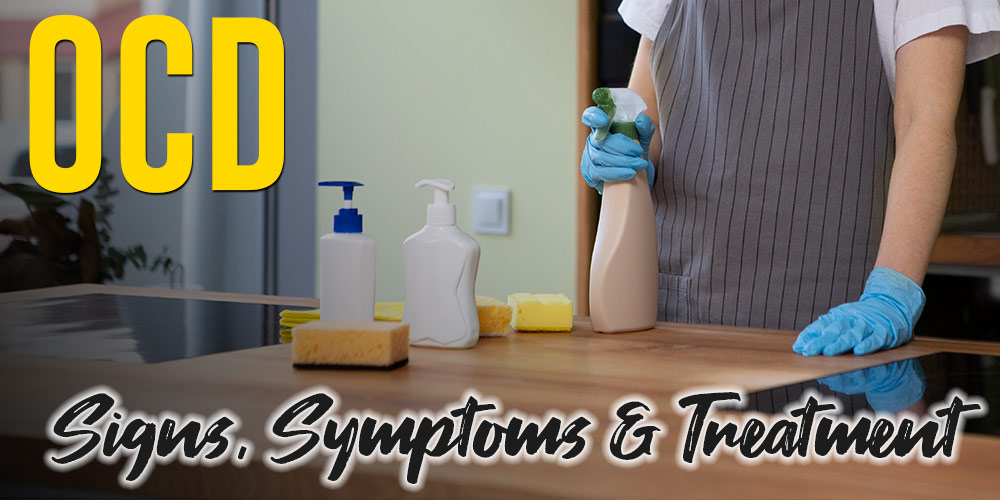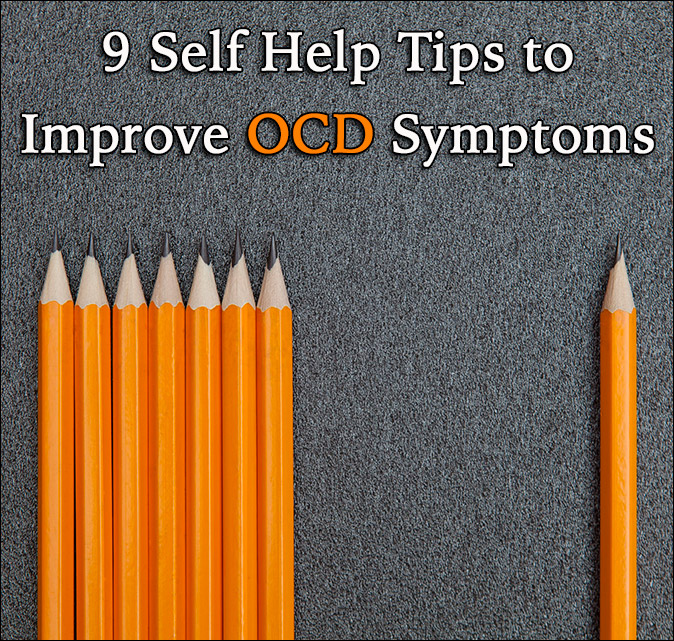The term Obsessive Compulsive Disorder / OCD is often used casually in conversation, however, it’s a serious illness. People suffering from OCD have obsessive unwanted intrusive thoughts.
These unwanted, invasive thoughts can lead a person to seek relief by carrying out repetitive behaviors – known as compulsions or obsessions.

Each person is affected by their own set of unique compulsions or obsessions.
Common OCD Symptoms Include:
- Fear of germs and frequently washing their hands
- Hoarding or compulsively buying things they don’t need
- Obsession with counting, order, arrangement and symmetry
- Repeatedly checking things that could cause harm like turning off the oven or locking doors
OCD is closely linked to PTSD and was previously considered to be rare. However, recent statistics show that as many as 2.2 million adults in the United States suffer from OCD.
OCD symptoms can begin in childhood and the average age for the condition to develop is 19.
Having a bad thought from time to time is normal and happens to everyone. The issue occurs when we tell ourselves stories or attribute meaning to these thoughts. OCD is generally considered a genetic or hereditary illness characterized by abnormalities in the brain.
Thankfully there are things we can do to overcome OCD and we’ll explore 9 ways to improve the symptoms of OCD.
What Causes OCD?
The root cause of OCD is not fully understood. However, it’s generally accepted that compulsions or obsessions are learned behaviors that people carry out to alleviate feelings of anxiety.
When a person is suffering from Obsessive-Compulsive Disorder, their perceptions and beliefs can become distorted.
This altered perception of the world in the OCD patient can be seen in brain scans, as enhanced activity in the orbitofrontal cortex.
This is a region in the prefrontal cortex of the brain and the area that is responsible for cognition and decision making.

Is OCD Caused by Trauma?
Childhood trauma can be the root cause of the development of psychiatric diseases later in life, including OCD.
Factors that contribute to whether a person suffers from OCD include stress, trauma, and adverse life experiences. Both stress and adverse life experiences can trigger or worsen the symptoms of OCD.
Types of OCD / Obsessive Compulsive Disorder
Researchers have classified the many symptoms of OCD into four major categories as follows:
- Contamination and Washing
- Doubts About Accidental Harm and Checking
- Symmetry, Arranging, Counting, and Just Right OCD
- Unacceptable Taboo Thoughts and Mental Rituals
OCD affects everyone differently and can be debilitating for some people.
OCD Treatment – Cognitive Behavioral Therapy
Cognitive Behavioral Therapy (CBT) for OCD can be an invaluable tool in the treatment of symptoms.
The tools and techniques learned from CBT allow people to clearly establish that their intrusive thoughts and urges are due to OCD and then reframe these thoughts rather than impulsively acting on them.
Dialectical Behavior Therapy (DBT) is similar to CBT and has also shown success in treating the signs and symptoms of OCD.
9 Self Help Tips to Improve OCD Symptoms
1. Acceptance of OCD
The first step in managing OCD is to accept that your anxiety or negative thoughts are caused by OCD.
Identifying thoughts that creep in as anxiety or OCD will stop you from thinking that they are real. Thoughts that stem from anxiety or OCD can make us feel as though we (or others) are in danger, when in fact there is no real danger at all.
2. Identify OCD Triggers
To manage the symptoms, it’s necessary to identify situations that trigger your OCD.
By becoming aware of your OCD triggers, you can begin to manage the negative behavior that results.
Try writing down everything that creates an urge to act out a compulsive action for a week or two. Then you can use this information to help you to take steps to refocus or lengthen the time between the triggers or urges and the compulsion.

3. Refocus
When regular triggers cause you to feel the urge to carry out an obsessive or compulsive activity, practice refocusing your thoughts and energy.
Changing the scene by deciding to do something else instead of the compulsive action will help delay the urge and change your response to the trigger.
4. Don’t Push Down Thoughts
Pushing down thoughts or arguing with them can cause them to persist or even get worse.
Instead, observe your thoughts, make note of them, and gently shift your focus away from them to move on.
Don’t try to rationalize them as they are not real, and instead, are simply manifestations of your OCD.
Meditation and mindfulness are tools used in cognitive therapies to keep the mind focuced and can help with managing your thoughts.
5. Keep a Journal
Keeping a journal of your obsessions can help you to get to know your OCD better.
Try writing your obsessions, compulsions and triggers down in a journal each day whenever possible. This can give you better insights into your OCD signs and symptoms.
You can keep a notebook with you to write episodes down as soon as they happen to jot down precise information about the experience you had while it’s still fresh in your mind.
6. Face Your Fears
By leaning into your OCD and the triggers that lead to compulsions, you can learn to manage it. Avoiding the symptoms of OCD will only make them worse.
Set some time aside each day to focus on your obsessions and compulsions. Review your journal and notice what you have been worrying about and how you have managed it.
By setting time aside you can free up the rest of your day, safe in the knowledge that you can address the issues later.
7. Accept The Gray Areas
It is easy to blame yourself for carrying out an obsessive thought or action. If you fall into old habits, accept it and move on.
You’ll have many more chances to get it right in due time. If you find yourself carrying out a compulsion, take note of the experience but don’t dwell on it.
8. Relaxation and Self-care
Set 30 minutes aside every day devoted to relaxation and self-care. Meditation and yoga are great ways to relax the nervous system and reduce stress.
Stress itself doesn’t cause OCD but it can make the symptoms worse or trigger an episode. Reducing stress in your life is one of the best ways to effectively manage your OCD.
9. Congratulate Yourself
Taking steps toward your recovery isn’t easy, so congratulate yourself every day for not only working on improving your symptoms but also for sticking with it.
Take note of the little wins in your journey and be proud of your efforts. It is important to measure and celebrate your successes to keep up the motivation and progress with your healing journey.
Oro Recovery Centers offers comprehensive treatment for people struggling with mental health disorders like OCD. Contact us today to learn more about our programs and how we can help you or your loved one start on the path toward healing.
Related Posts
- Addictive Personality Disorder
The last decade has seen an increase in reported cases of substance abuse. Behavioral addictions…
- Cocaine Withdrawal Symptoms, Treatment and Detox
Giving up a stimulant substance like cocaine has a complex psychological effect on the recovering…
- High-Functioning Anxiety Symptoms and Treatment
Anxiety disorders are the most common form of mental illness in the United States. They…
